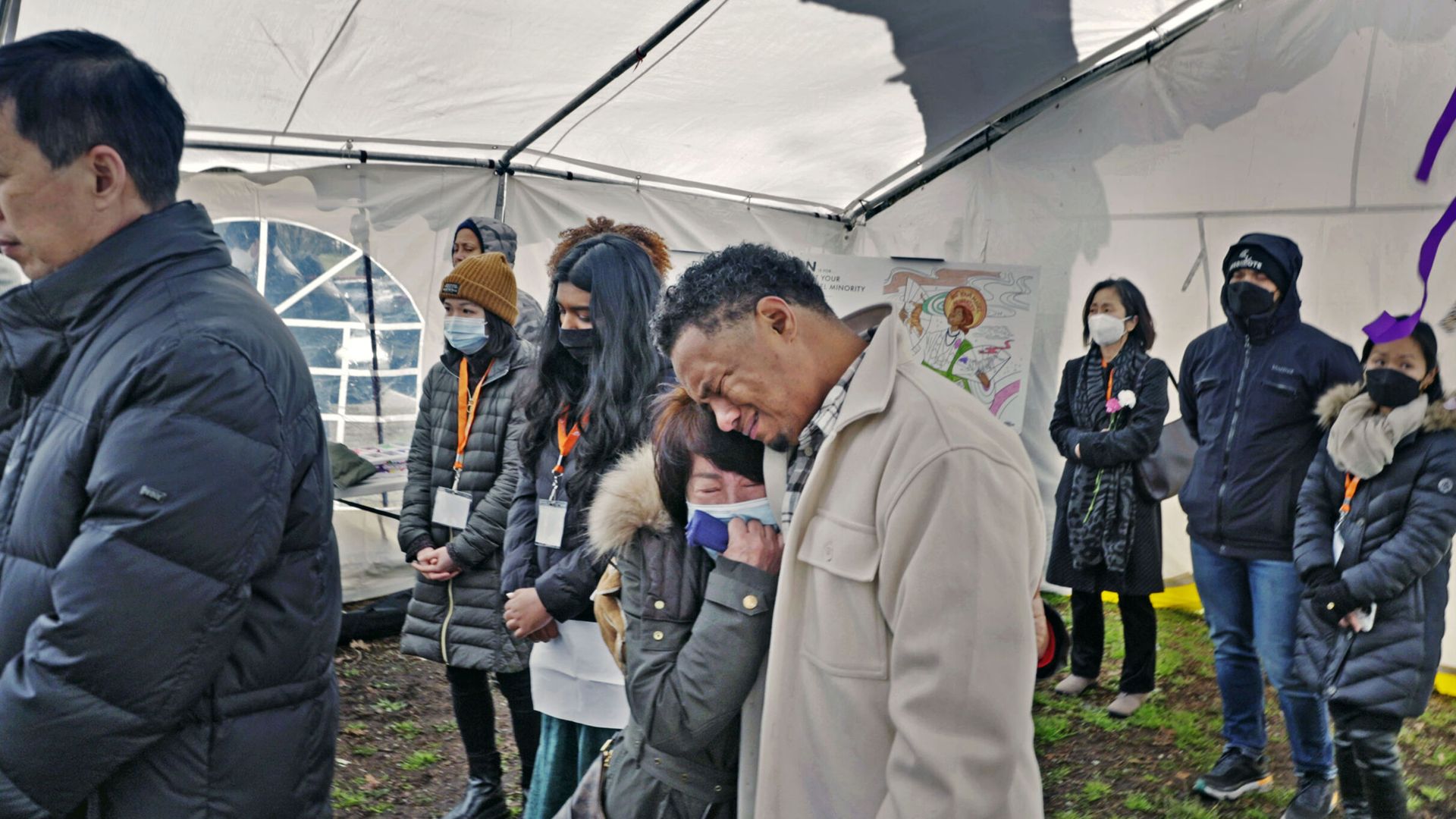Documenting the movement galvanized by the Atlanta spa shootings
Add Axios as your preferred source to
see more of our stories on Google.

Robert Peterson, son of Yong Ae Yue who was one of the victims of the Atlanta spa shootings, comforts his mother's best friend at the one-year anniversary memorial. Photo: BJ Orr/© Repartee Films
When Robert Peterson's mother Yong Ae Yue died in the Atlanta spa shootings, he had to tell his brother, "Mom's not coming back." It was clear even then, though, that the murder of their mother — an Asian woman "targeted for who she was" — would serve as the linchpin for something much bigger.
Driving the news: The Atlanta spa shootings led to protests against anti-Asian hate across the U.S., but the momentum has faded, Peterson told Axios. A year and a half after a white gunman shot and killed eight people, six of them Asian women, a new PBS documentary aims to immortalize their legacy and the movement against anti-Asian hate.
How it happened: Executive producer Gina Kim approached director Titi Yu about making "Rising Against Asian Hate: One Day in March" in August last year.
- "When the pandemic happened ... a lot of us in the Asian American community were seeing all these horrific videos of Asian American elderly and women being attacked on the streets," Yu said.
- "At the same time we were also seeing this rhetoric coming from elected officials about, you know, just really blaming Asian Americans for this global tragedy."
- March 16 — the date of the shooting — was "in a certain way the catalyst to talk about what was happening in the Asian American community since the pandemic," she added.
Details: "Rising Against Asian Hate" tells first and foremost the story of how the Asian American community in Atlanta weathered the tragedy.
- The filmmakers prioritized speaking with the family members of those who died but made it a point to highlight grassroots organizers working to combat hate and racism, Yu said.
- Narrated by Emmy-nominated actress Sandra Oh, the documentary also zooms out to situate the audience in the climate of fear among Asian American communities in New York City and San Francisco, two epicenters of anti-Asian hate crimes.
- The film features interviews with Peterson, local community leaders and politicians including Rep. Grace Meng (D-N.Y.), Georgia state Sen. Michelle Au (D) and Georgia state Rep. Bee Nguyen (D).
What they're saying: Peterson, who watched the documentary twice before it premiered, said he had to prepare himself — "it's very traumatizing for me sometimes."
- But this story is also "about the other mothers and sisters and people out there that shouldn't have to experience what my family has gone through," he noted. "That's why I know that it's bigger than my mother."
- "Since my mother's murder, Asian women in particular have continued to be struck by violence," Peterson said. "Beyond that hate crimes bill, we have not really invested too much in Asian American communities."
- "And so it's just continuously important to speak out. This is an issue that we've dealt with time and time again, but our voices are not tired."
Worth noting: Peterson's family is pushing for a hate crime enhancement and the death penalty for the gunman.
- "The fact that we're fighting for it to be recognized as a hate crime is important to me," he said.
- "That's symbolically important, but we want to see that not only are we listened to but we're invested in ... [not only] when the anniversary comes around or when you need something from us but that we continuously have a seat at the table."
Go deeper: Asian Americans in Atlanta channel pain from spa shootings into advocacy
